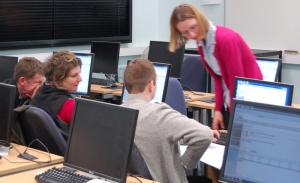Everyone knows Wikipedia. Perhaps less known is the fact that a similar wiki tool that Wikipedia is built on, is available in VITAL called Campus Pack Wiki. Wikis are collaborative websites which anyone can edit, usually because they offer an easy-to-use text editor.
Wiki pages can contain text or multimedia and are interlinked together. The use of wikis is now increasingly gaining popularity amongst staff, together with blogs and podcasts. The wiki tool within VITAL allows students to create websites within modules which can be used for a range of teaching and learning tasks including group projects, research tasks, communicating results of individual and group tasks. Staff can also set up template wiki pages which students can fill out.

The eLearning Unit ran a workshop for 12 members of staff on collaborative group work using wikis on Tuesday 8th Feb. The first part of the workshop included a hands-on session, in which participants saw how easy it was to create a wiki within the module and edit its pages and how students’ work in wikis is tracked by page and editing statistics, as well as how wikis can be assessed. On retrospect, we could have done with a bit longer session in the computer lab but we managed to get through all the parts. Thanks to a lively and engaged group of staff, a discussion about the teaching and learning issues when using wikis already started in the computer lab. Questions included the way of assessing wikis fairly, given that the tool only gives you a rough idea of students’ contributions? The short discussion was put on hold as the second part of the workshop was going to cover these issues.
After a quick sandwich lunch, with the facilitation of Janet Strivens, one of our educational development gurus on group work, participants were shown a couple of case studies around the university using wikis. We then moved on to the issue of managing and facilitating group work. Janet had some good tips, and it was interesting to hear similar tips from participating workshop staff too. A key piece of advice from Janet was to let students know why they are working in groups, what the benefits group work is to bring and how the assessment will be conducted, whether there will be a joint group mark or groups will be peer-and self-assessed to arrive at individual marks.
We then moved on to discuss different ways of assessing group work: whether one assesses the product of the group’s work or the process of students working together. Thanks to an Engineering Report on peer review practices, we were able to show staff a few different approaches to peer assessment. Again, participants contributed their experiences and practices here, which was very useful. One included having tried and tested six different peer assessment approaches before settling on one!
Other staff are piloting the use of a peer assessment software, webPA, in the university. A recent REAP resource pools together knowledge about a number of peer assessment tools.
The workshop resources are on VITAL in the Creating blended learning module – if you don’t have access to this, please email elearning@liv.ac.uk and we will add you to the module. Alternatively, we hope to run this, or parts of this, workshop again in our summer school (possibly in June). As ever, if you have any questions on using wikis or how best to do group work, or if you have a good example of group work to share, please contact us on elearning@liv.ac.uk.
Tünde